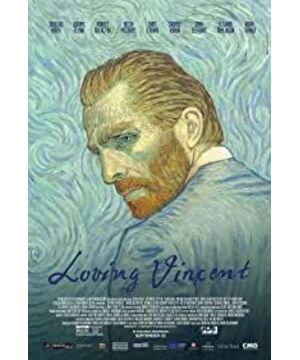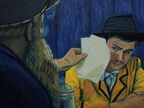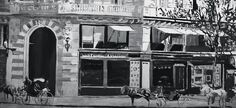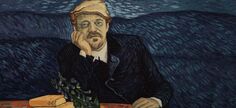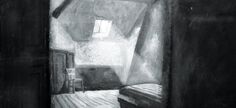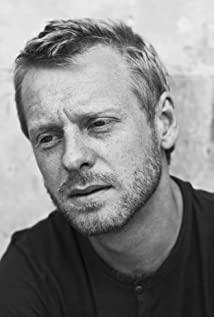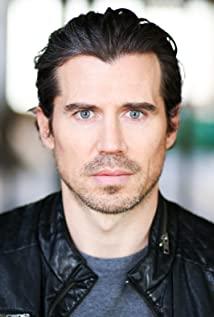The story-level idea of Beloved Van Gogh is good, with Armand Roulin sending a letter to Auvers-sur-Oise for his father as a MacGuffin, a quick review of Van Gogh's journey from Paris to Arles to Auvers-sur- Oise's life. The Armand of Beloved Van Gogh is the rosebud of Citizen Kane.
Van Gogh's more than a year living in Arles is considered the happiest period of his life - just not as bad as others - during which many of his masterpieces were completed. In Arles he became acquainted with a postman named Joseph Roulin, and Van Gogh painted many portraits of the Roulin family. "Love Van Gogh" selects Joseph's son Armand as the role of the needle, and the angle is very tricky. According to historical records, Van Gogh spoke highly of Joseph, and Joseph also valued Van Gogh's talent. In addition, Van Gogh did not have much contact with the rest of the Roland family, so Armand knew who Van Gogh was, but he did not know who Van Gogh was. He, who was an outlander in Auvers-sur-Oise, these biographies naturally gave him a legitimate motivation for the enigma of the final stages of Van Gogh's life.
Auvers-sur-Oise was Van Gogh's residence for the last three months of his life, where he was in close contact with Dr. Paul Gachet. "Love Van Gogh" Armand searched for the people Van Gogh met during Auvers's lifetime, hoping to learn more about Van Gogh's experience in the final stage of his life. This need is embodied in the story: the desire to know the cause of Van Gogh's death. This is an effective way to type films, because clear clues, like clear types, make it easier for ordinary viewers to follow the direction of the story while watching the film.
My most direct impression of "Beloved Van Gogh" is "faithful". As for whether being "faithful" to this level is a good thing for the movie itself, everyone has their own opinions.
The script is very careful to be faithful to various facts and assumptions. For example, Armand has always emphasized to everyone that "Van Gogh is a friend of his father" - this is the point where the crew told the audience that "Van Gogh was only acquainted with the father of the Roulin family". The way of the facts; Dr. Gachet said to Armand "your father was a great southern man with the soul of Dostoevsky" - Van Gogh mentioned in his letter that Joseph looked like Dostoyevs Key; the story begins with Joseph and Armand talking about Paul Gauguin, about Van Gogh cutting off his ear as a gift to a prostitute - the breakup between Gauguin and Van Gogh was an important experience of Van Gogh in Arles One, actually Van Gogh sent the ear not to the prostitute he and Gauguin frequented.
The script also includes the "Van Gogh Homicide Hypothesis" that has been re-hyped in recent years, and even sets it as the most important contradiction in the main line, with the intention of leading the story forward. The crew probably felt that the best way to get close to the historical truth was to use a Virgo-style exhaustive method to include all the hypotheses, and the credibility of the hypotheses may not be their primary concern.
In addition, they also neglected to control the accuracy of facts in some small places. Dr. Gachet deliberately said to Armand, "My father forced me to study medicine" - in fact, Dr. Gachet's father was in the wool industry, and he went against his father's wishes for his son to inherit his father's business and become a doctor. The script is that he doesn't want to study medicine, but the fact is that he wants to study medicine, which means the exact opposite. The daughter of the Ravoux hotel owner told Armand that "Dr. Gachet was a military doctor, but he did not take the bullet out of Van Gogh's body" - Dr. Gachet was indeed a military doctor during the Paris Commune. The screenwriter may only intend to make this line represent the character's personal standpoint, but I think it is necessary to emphasize that Dr. Gachet is a homeopathie. He is a psychiatrist, not a surgeon. He doesn't know how to perform surgery. normal.
The characters are faithful to the faces of the voice actors and can be seen to be drawn from a video of the actor's performance. The scenes of the film are faithful to Van Gogh's paintings, the level of beauty is breathtaking, and the copying reaches the level of the real. Armand went to the church to look for Dr. Gachet's butler. The church scene was copied from Van Gogh's famous painting "The Church of Auvers"; the scene where Dr. Gachet was waiting to chat with Armand was consistent with Van Gogh's portrait of him holding his cheeks . Armand walked through the field road, and a few crows flew beside him, the style was the same as "The Crows in the Wheat Field", and so on.
Beloved Van Gogh was so concerned with cramming as much information as possible into the script that the story seemed incoherent, more like a collage of fragmented scenes. It's more of a documentary than a feature film, or a slideshow. Regardless of whether these small town residents in Auvers really knew that Van Gogh had an older brother who died early, a southerner who delivered a letter broke into their lives, and started chatting about the experience of an unknown dead person within three sentences. Incessantly? In contrast, my attitude towards the courier brother deserves my reflection. In order to introduce the audience to the life of Van Gogh, these supporting characters lost their personalities. The biography of Armand mentioned above provides rationality for the main line of the story, but the story can stand up, it is impossible to rely only on the rationality of MacGuffin, other characters and the story itself must follow a certain logic.
The defects of the story may have something to do with the form of the film. More than 100 painters painted in the way of imitating Van Gogh. This level of complexity did not allow the crew to polish the work of the painting stage based on the story. Even if the story needs to be improved after painting, it is very May be powerless.
Another feature of this film is that Van Gogh is shaped into a strong personality from the side, and the film emphasizes his strong desire to become a great artist. The way the film expresses this point of view is that Armand takes a carriage back to Arles - the location he passes by is copied from "The Red Vineyard of Arles", which is the only work Van Gogh sold during his lifetime -, in the carriage. On him read a letter from Van Gogh, complete with Van Gogh's monologue:
What am I in the eyes of most people - a nonentity, an eccentric or an unpleasant person - somebody who has no position in society and never will have, in short, the lowest of the low.
All right, then - even if that were absolutely true, then I should one day like to show by my work what such an eccentric, such a nobody, has in his heart.
This letter is real. It was written on July 21, 1882. Vincent van Gogh was 29 years old. He was in The Hague and was just beginning to pursue his artistic dream. "Love Van Gogh", which explores the reasons for Van Gogh's suicide at the age of 37, ends with this letter, which is emotionally contrarian. He used to be youthful, or rather self-motivated—in fact elsewhere in that letter Van Gogh mentioned that he was in a bad mood—but at 37, Van Gogh was already tortured, and his confidence in himself was just an emotion An episodic state in an iterative process. And Maurice Pialat's French film "Van Gogh" (Van Gogh, 1991), the protagonist does not deliberately tell the background information of Van Gogh in his lines, and repeat his own letters, but whether he is crazy or creative, he shows weakness, submissiveness and doubt. A weak personality who is self, just passing by, and having fun in time.
After watching "Love Van Gogh", Maurice Piara's "Van Gogh" is a comparison movie that cannot be missed. Both movies focus on Auvers, the place where Van Gogh was buried, from completely different angles. The former focuses on shaping the personality of Van Gogh himself, and incidentally mentions some major events in other periods of Van Gogh's life, and the supporting roles are functional symbols; the latter focuses on restoring the early life style of the French Third Republic-Van Gogh died in 1890, Major historical events such as the Franco-Prussian War, the Paris Commune, and the "Bloody Week" were just over 20 years past for the French at that time, which is the feeling of looking back at the return of Hong Kong at our current point. Feelings are written into the film—there are no documentary-style lines, and Van Gogh's own story is extremely de-dramatized, and he seems to be just the MacGuffin of the film. It is a pity that "Van Gogh" did not get the attention of the movie audience that matched its value. Perhaps the lines are too colloquial and difficult for foreigners to understand. The film was shortlisted for the 1991 Cannes Film Festival competition. The jury led by Polanski liked the other competition film "Barton Funk" very much, and gave it three awards: Palme d'Or, Best Director and Best Actor. , "Van Gogh" was left out. Van Gogh, which represented France in the Best Foreign Language Film Oscar nomination, was also not nominated.
https://weibo.com/ttarticle/p/show?id=2309404183785640997898
View more about Loving Vincent reviews


